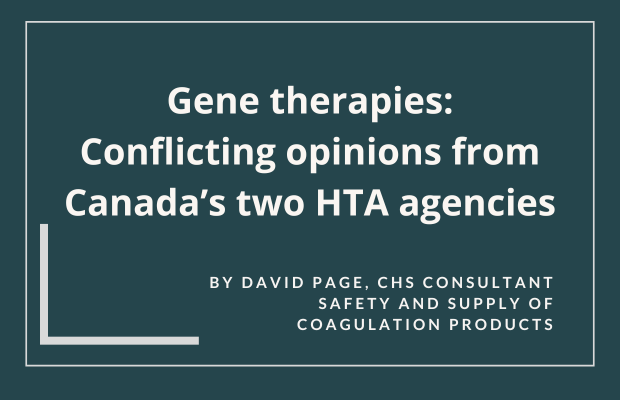Conflicting opinions on gene therapies from Canada’s two HTA agencies

Montreal, July 5, 2024 – Canada’s two health technology assessment (HTA) agencies have made conflicting recommendations on two gene therapies for hemophilia B.
Earlier in 2024, Canada’s Drug Agency (CDA; formerly called CADTH), which makes recommendations on novel drugs to public health plans outside Québec, recommended that both Beqvez (fidanacogene elaparvovec) and Hemgenix (etranacogene dezaparvovec) be reimbursed, conditional on a price reduction, for adults with severe and moderately severe hemophilia B. Over the last month, however, the Institut national d’excellence en santé et en services sociaux (INESSS), which provides the same service in Québec, released reports recommending against reimbursement of the two gene therapies based on a “lack of therapeutic value.”
“How can two HTA bodies, looking at the same evidence for the same therapies for the same patient group at the same time, come to completely different conclusions?” asked Manon Lemire, Canadian Hemophilia Society Québec Chapter (CHSQ) President. “CDA says the therapies reduce annual bleeding rates, decrease factor IX (FIX) consumption and meet important patient needs. INESSS says it doesn’t recognize their therapeutic value. How can you have confidence in HTA assessments faced with such inconsistencies?”
These recommendations from INESSS not to make gene therapy available in Québec comes after two successive assessments of emicizumab (Hemlibra) by INESSS for hemophilia A in 2020 and 2021, finding them inferior to FVIII prophylaxis, an assessment that was eventually deemed flawed by the Québec Ministère de la Santé et des Services sociaux. A decision was made to reimburse emicizumab and, since then, over three-quarters of people with severe hemophilia A in Québec and indeed in the rest of Canada have switched from factor VIII to emicizumab prophylaxis.
Strangely, the INESSS report on Hemgenix, released on July 3, cites very positive clinical trial results.
- There was a 78% reduction in joint annual bleed rates after gene therapy indicating either non-inferiority or superiority to FIX prophylaxis.
- There was a 97% reduction in FIX consumption.
- Mean FIX levels were 36.9% at 18 months and 38.6% at 36 months, showing long-term durability.
- Only 3 of 54 (6%) of patients had FIX levels less than 12% FIX at 36 months post-infusion.
- Only 3 of 54 recipients continued on or returned to FIX prophylaxis.
- 63% of gene therapy recipients had 0 bleeds between 7 and 18 months post-infusion compared to 25.9% on FIX.
- Only 11 of 54 (20.4%) had raised liver enzymes (ALTs) and only 9 of 54 (16.7%) received steroids to counteract raised ALTs (much lower than rates in other GT trials).
- EQ-5D-5L-VAS, a quality-of-life scale, showed improved QoL at 24 months.
- INESSS recognized the significant unmet needs with current treatments.
- INESSS also recognized that IV prophylaxis is burdensome.
- INESSS concluded that the Hemgenix efficacy and safety data are acceptable.
INESSS used extended half-life (EHL) FIX as the comparator to gene therapy even though EHL FIX is not available to adults in Québec, based on previous INESSS recommendations.
Yet INESSS gave the following reasons in its assessment of a lack of therapeutic value.
- FIX prophylaxis is safe and effective and prevents the majority of bleeds; health needs are partly met by current treatments.
- The evaluators were preoccupied by the lack of long-term data on efficacy of these gene therapies.
- They were also preoccupied by 3 of 54 recipients returning to prophylaxis.
- They stated that taking this gene therapy would preclude people from taking a future gene therapy.
- The long-term safety is unknown.
- There was a lack of improvement in QoL at 12 months (though this had changed at 24 months).
- There is too much uncertainty.
Very similar reasons were given by INESSS for rejecting Beqvez in June.
Given the negative assessment of therapeutic value by INESSS, the next stage in the evaluation of a new therapy, a cost-effectiveness analysis, will not take place. To be clear, these gene therapies were not rejected because of cost, but by INESSS’ interpretation of safety and efficacy compared to a current treatment modality (EHL FIX in their analysis).
Meanwhile, in the rest of Canada, negotiations have begun or will begin soon between the manufacturers, Pfizer and CSL Behring, and the pan-Canadian Pharmaceutical Alliance to establish a price for the public drug plans. As a result of these recommendations from INESSS, Québec will not participate in the negotiations. Decisions on whether or not to reimburse these therapies will then be made in each jurisdiction.
“The CHSQ is considering its next steps to contest this dubious assessment,” said Manon Lemire.




